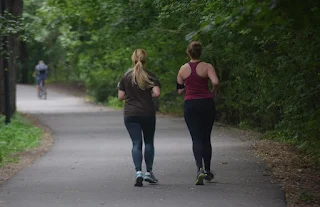Morning Walks Turn Risky: How Delhi's Toxic Air is Harming Health
Air Pollution in Delhi: A Growing Health Emergency
Delhi, India’s bustling capital, is known for its rich culture, history, and rapid modernization. But in recent years, the city has increasingly been in the global spotlight for something far more concerning: air pollution. The thick, toxic smog that engulfs the city each winter is no longer just an environmental issue—it has now transformed into a full-fledged public health crisis.
Over the past few days, hospitals across Delhi have reported a significant surge in patients suffering from pollution-related illnesses. From common colds and sore throats to burning eyes and even respiratory failure, the impact of air pollution is clearly visible in the rising number of people seeking medical help.
According to the United Nations Environment Programme (UNEP), air pollution kills around seven million people globally every year. While Delhi has not officially reported any air pollution-related deaths recently, the burden on the healthcare system is growing rapidly. Doctors across the city are warning that the air quality has reached levels that pose serious risks to public health.
Air Pollution and Its Impact on Health
Dr. Ajit Kumar, a renowned chest disease specialist at Delhi Hospital, has firsthand insight into how air pollution is affecting the residents of the capital. He shared that the number of patients suffering from various ailments linked to poor air quality has spiked in the past few weeks.
“The number of patients visiting hospitals is gradually increasing due to pollution,” Dr. Ajit said. “Especially, more people are coming in with respiratory problems. Along with this, they are suffering from eye, nose, ear, throat, and skin issues. Patients are complaining of sore throats, burning and watery eyes, and even chest infections. Some patients have had to be admitted to the ICU due to the severity of their symptoms.”
These alarming developments are not isolated cases. Across Delhi, doctors are reporting similar cases of deteriorating health conditions directly linked to air quality. A key concern raised by Dr. Ajit and other healthcare professionals is that air pollution doesn't just affect the lungs—it also increases the risk of heart attacks and other cardiovascular conditions. Fine particulate matter (PM2.5), nitrogen dioxide (NO2), and other airborne pollutants are capable of entering the bloodstream, leading to systemic inflammation, high blood pressure, and other life-threatening issues.
Who Is Most at Risk?
While poor air quality is harmful to everyone, some groups are more vulnerable than others. Dr. Ajit stressed that the elderly, children, pregnant and lactating women, and people with chronic diseases such as heart, kidney, or respiratory conditions are at significantly higher risk.
“In terms of age groups, the elderly and children are always at the highest risk,” Dr. Ajit said. “Pregnant and breastfeeding women also need to be especially careful. Additionally, people with pre-existing conditions like heart disease, kidney issues, and respiratory ailments need to take extra precautions during this period.”
This is particularly concerning in a city like Delhi, where millions of people fall into one or more of these high-risk categories. For these individuals, even a short exposure to outdoor air can trigger severe health complications.
Morning Walks: A Hidden Danger
One surprising piece of advice from Dr. Ajit has caught the attention of many residents: stop going on morning walks.
It’s widely believed that a morning walk is one of the healthiest daily habits. For decades, people have started their day with a brisk walk to improve their physical and mental well-being. But according to Dr. Ajit, under current pollution conditions, this practice might be doing more harm than good.
“We exercise and take morning walks to stay healthy,” he explained. “But when walking outside now causes more diseases and makes you more unwell, what is the point of walking? Walking in the current situation is very dangerous. If you must walk, do it inside your room or indoors.”
This suggestion stems from the fact that pollution levels in Delhi tend to peak in the early morning hours, when temperature inversion traps pollutants close to the ground. During this time, levels of PM2.5 and other harmful pollutants are at their highest, and breathing in this air can be extremely hazardous.
Precautions for the Public
In response to the worsening air quality, Dr. Ajit and other experts recommend a few critical steps to protect oneself and loved ones:
- Avoid Outdoor Activities: Especially during early mornings and late evenings when pollution levels are highest.
- Use N95 Masks: If you must go outside, wear a certified N95 mask to filter harmful particulates.
- Stay Indoors: Try to stay inside as much as possible, particularly for high-risk groups.
- Use Air Purifiers: Indoors, air purifiers can help reduce exposure to pollutants.
- Stay Hydrated and Eat Well: A balanced diet and proper hydration can strengthen your immune system.
- Regular Medical Checkups: Especially for people with chronic health issues, regular monitoring is vital.
- Limit Physical Exertion Outdoors: Avoid activities like jogging, cycling, or outdoor sports until air quality improves.
What Should the Government Do?
While individual precautions are essential, tackling Delhi’s air pollution crisis also requires urgent government intervention. Dr. Ajit emphasized the need for the government to consult with health and environmental experts and implement strict measures to curb emissions and safeguard public health.
“If the government is truly concerned about public health, immediate steps are necessary,” he said. “Consulting with experts, enforcing regulations on emissions, reducing vehicular traffic, and controlling industrial pollution should be top priorities.”
Some measures that the government could consider include:
- Implementing odd-even vehicle rationing schemes.
- Temporarily shutting down construction activities.
- Increasing green cover and urban forestry.
- Promoting public transportation and clean energy vehicles.
- Banning firecrackers and enforcing strict rules on industrial emissions.
The Bigger Picture
Delhi’s air pollution crisis is not just a local problem. It reflects a broader global challenge. With rapid urbanization, increasing vehicle ownership, and dependence on fossil fuels, cities around the world are struggling to maintain air quality. According to the World Health Organization (WHO), 99% of the world’s population now breathes air that exceeds recommended pollution levels.
This has enormous implications for global health, particularly in low- and middle-income countries like India, where healthcare systems are already under pressure. Children growing up in polluted cities are at risk of stunted lung development, while the elderly face higher rates of respiratory and cardiac diseases. The economic cost of lost productivity, hospitalizations, and premature deaths is staggering.
A Call for Awareness and Action
While solutions to air pollution require systemic change, individual awareness and responsibility play a crucial role. People must understand the gravity of the situation and make informed decisions. Whether it’s choosing to take public transportation, planting trees, or simply staying indoors on high-pollution days, every action counts.
Dr. Ajit’s message is clear: Health comes first. No tradition or habit—however beneficial it may seem—should be continued at the cost of one’s well-being. In these times, even something as innocent as a morning walk might be putting your health at risk.
Conclusion
Delhi’s air pollution has crossed dangerous levels, threatening the health of millions. From children to the elderly, no one is safe. As doctors raise the alarm and hospitals fill with patients, it is time for both the public and the government to take this issue with the seriousness it deserves.
Morning walks and outdoor exercises can wait. Right now, the priority must be to breathe clean air, stay protected, and work together to demand stronger environmental policies. Air pollution is invisible—but its effects are deadly. Let’s not ignore the warnings and risk our health in the pursuit of routine.











